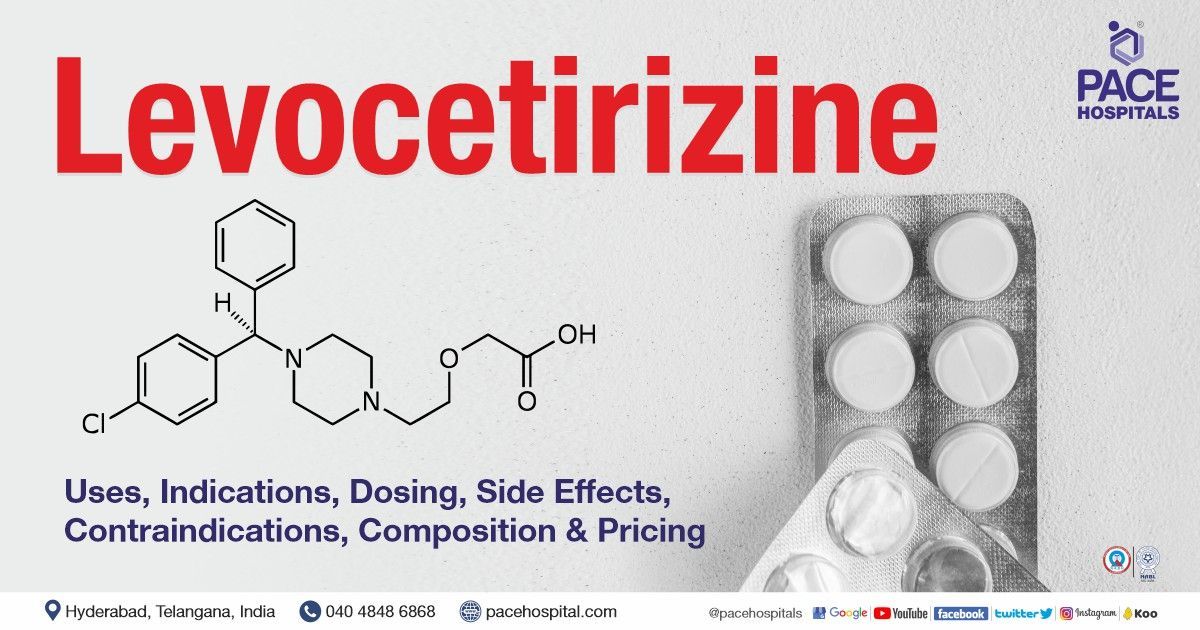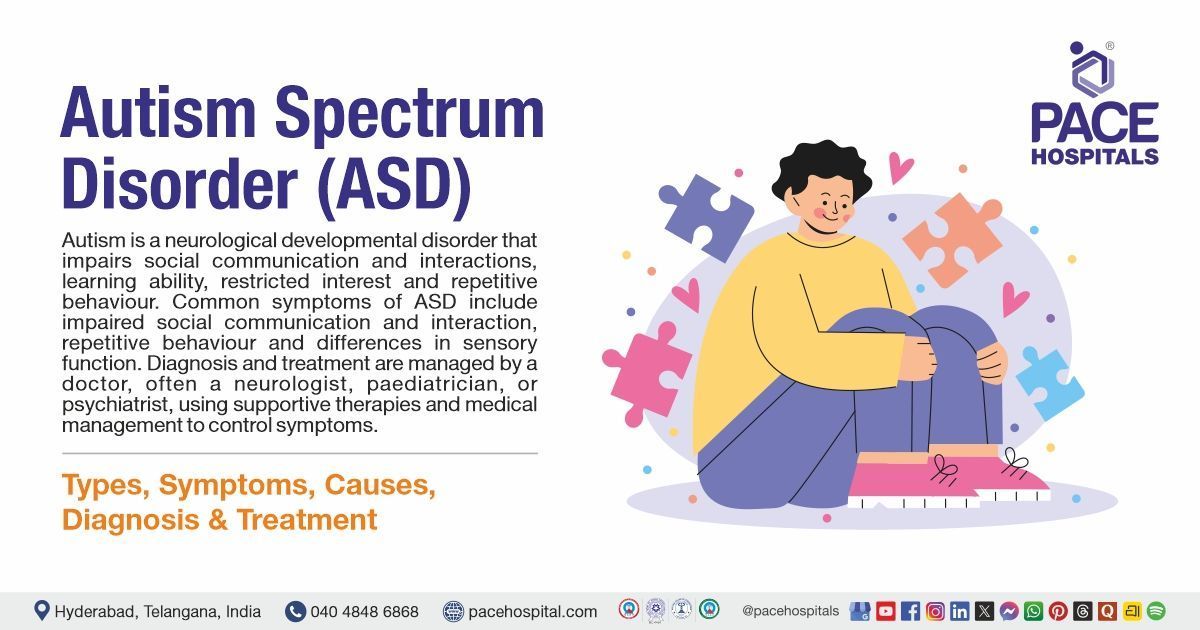Levocetirizine – Uses, Side Effects, Composition and Price
PACE Hospitals
Levocetirizine comes under Antihistamine - Drug class, which treat the symptoms of seasonal allergies, allergic rhinitis, sore throat, and chronic idiopathic urticaria. It has the advantage of being sedative than other antihistamine drugs.
Overview of levocetirizine
Levocetirizine is a class of histamine antagonist (acts against the histamine chemical which is responsible for allergy). Levocetirizine was initially approved by the United States in 1995, it is less sedative when compared to other antihistamine drugs.
Levocetirizine is used to treat the symptoms associated with seasonal allergies, allergic rhinitis (hay fever causes sneezing, itchy nose and sore throat due to pollens, insects, and dust), and chronic idiopathic urticaria (allergic condition to skin).
Levocetirizine is available as 5 mg tablets (levocetirizine tablets IP) as well as oral solution forms (levocetirizine syrup).
Levocetirizine uses
Levocetirizine tablet uses can range from various allergic conditions that are caused due to seasonal or perennial (longstanding) allergens. Levocetirizine is majorly used to treat sneezing, itching, watery eyes, and redness caused due to allergic rhinitis.
Levocetirizine is used to treat acute and chronic urticaria (skin reaction caused due to interaction with food, medicine or other irritants). The physicians mainly use this drug – levocetirizine to treat the above conditions as it shows faster duration of action than various other antihistamines such as desloratadine.
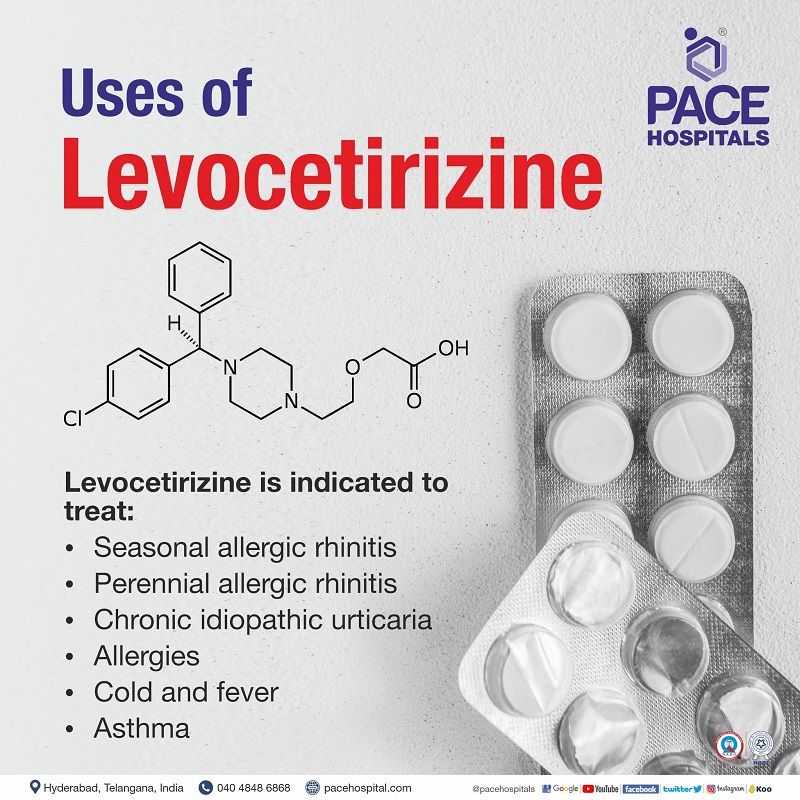
General considerations to follow while taking levocetirizine tablet
- Take this medication once in the evening with or without food.
- Measure the accurate dose with measuring device while taking the oral solution, thereby preventing the over/under dose.
- Avoid activities related to mental co-ordination (driving, operating machinery)
- Avoid administration of drug in case of any hyperreaction (the body reacts to the drug which could range induce immune-mediated reaction ranging from mild to severe which includes rash, anaphylaxis, and serum sickness).
- Avoid co-administration with central nervous depressant drugs or alcohol which may lead to impairment of central nervous system.
- Take it in regular time intervals daily to get a better result.
- Do not take two doses at the same time as it leads to adverse events. In case of a missed dose (due to forgetfulness etc) the next dose must be taken immediately as and when it is remembered but if it is close to the next dosing schedule, skip it and go for the next dose.
- Follow the treatment chart as directed by the physician.
Levocetirizine mechanism of action
Levocetirizine is an active isomer of cetirizine which blocks the histamine receptors by binding to it, thus the levocetirizine is classified into histamine antagonist (acts against histamine).
Histamine is a chemical released by mast cells which is responsible for causing allergy-like-symptoms. On binding the levocetirizine with histamine receptors, the levocetirizine inhibits the histamine releasing from mast cells and prevents the release of allergy causing chemicals and thereby increases the blood supply to the area and prevents the allergic symptoms.
Levocetirizine indications
Levocetirizine dihydrochloride tablet uses or indications for:
- Seasonal allergic rhinitis - also known as hay fever which in turn causes itchy nose, redness, and watery eyes seasonally due to reaction with dust, pollens, and insects).
- Perennial allergic rhinitis - same as seasonal allergic rhinitis, but it is long-lasting or continuing yearly/annually.
- Chronic idiopathic urticaria - the exact cause is not known for this condition, but it leads to skin rashes/hives which are chronic and are seen more than two times a week and lasts for months to years.
- Allergies which are mild to moderate.
- Cold and fever by administering with combination of drugs such as (levocetirizine + phenylephrine + paracetamol) or (levocetirizine + ambroxol hydrochloride + paracetamol)
- Asthma (montelukast sodium and levocetirizine hydrochloride tablets) given to treat wheezing and shortness of breath.
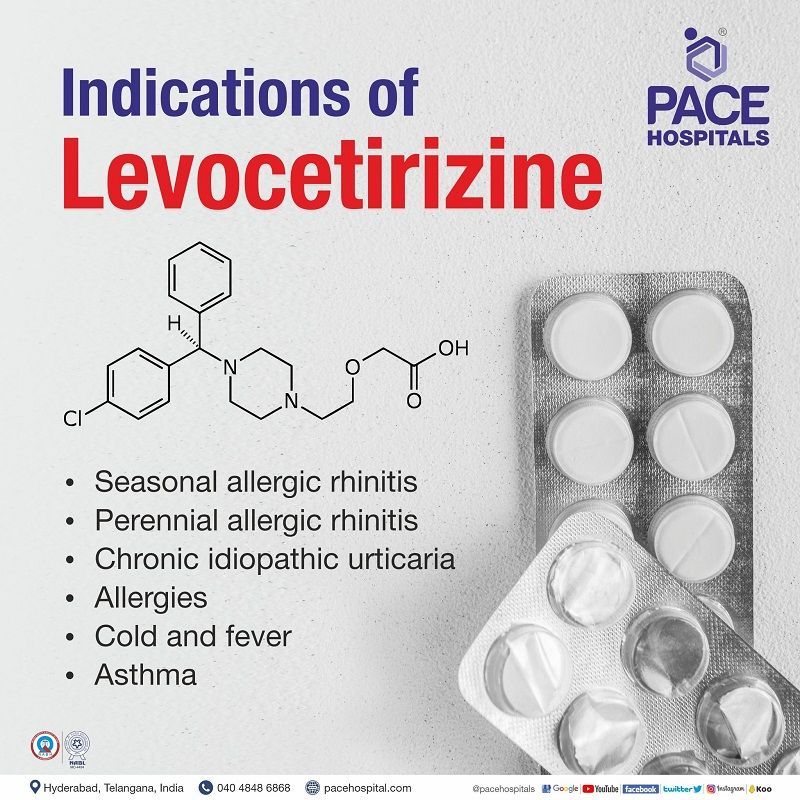
Levocetirizine dosage
Dosage Forms & Strengths of levocetirizine:
- 5 mg (tablet).
- 2.5 mg/5ml (oral solution) Each ml contains 0.5 mg of drug.
Levocetirizine dose for adults (≥12 years and older):
- For allergic rhinitis and urticaria: The recommended dose of levocetirizine for use in adults is 5mg tablet or 2 teaspoons (10ml) oral solution once daily in the evening, few patients may be controlled with half of the recommended dose based on severity.
Levocetirizine paediatric dose (6 to 11 years of age):
- For allergic rhinitis and urticaria: The recommended dose of levocetirizine for use in adults is 2.5mg (1/2 tablet or 1 teaspoon (5ml) oral solution once daily in the evening.
Modified dose for renal and hepatic impairment patients (in adults):
- Mild renal impairment patients (creatinine clearance [ClCr] = 50-80 mL/min): 2.5 mg once daily is recommended.
- Moderate renal impairment patients (ClCr = 30-50 mL/min): 2.5mg once on every alternate day is recommended.
- Severe renal impairment patients (ClCr = 10-30 mL/min): 2.5mg twice weekly (administered once every 3-4 days) is recommended.
- Final stage renal patients (ClCr < 10 mL/min): should not be treated with levocetirizine.
- Note: No modification is needed in patients with only hepatic impairment. Adjustment is needed only if the patient has both hepatic and renal impairment.
Disclaimer: The dosing information (doses, dosages frequency, and everything connected) provided here is compiled from accurate trusted sources. Nevertheless, we neither cannot guarantee its accuracy nor shall be responsible for any of its update. We do not encourage self-medication. The treating physician retains the medical discretion of administering or discontinuing the drug.
Levocetirizine for cold
Studies has shown that levocetirizine is much effective to treat cold and runny nose when compared to that of other antihistamines.
Case scenario 1:
A 2005 study demonstrated the higher duration of levocetirizine’s action in improving the nasal symptoms when compared to fexofenadine in who were exposed to pollen (allergens). Although both levocetirizine and fexofenadine displayed rapid action in decreasing the symptoms of cold and allergic rhinitis (such as rhinorrhoea, sneezing, nasal itching, eye itching, nasal congestion, nasal secretion), the duration of levocetirizine’s action was more potent than that of fexofenadine in improving the symptoms of rhinitis 22–28 h after drug use.
Case scenario 2:
A 2017 study demonstrated the effectiveness of fixed dose combination of levocetirizine, paracetamol and phenylephrine in 156 children suffering with common cold for 2 days. It was concluded that within 5 days, symptoms in 87.92% of the children were resolved.
Levocetirizine side effects
Generally, it is observed that Levocetirizine tablet doesn’t cause any side effects. However, in some cases, these are some common side effects experienced by adults and children.
Common side effects in adults (≥12 years and older):
- Somnolence (feeling of drowsiness)
- Nasopharyngitis (common cold)
- Fatigue (feeling tired)
- Xerostomia (Dry mouth)
- Pharyngitis (irritation in the throat)
Common side effects in children aged 6–12 years:
- Pyrexia (increased body temperature)
- Cough
- Epistaxis (nosebleed)
Postmarketing side effects:
- Hypersensitivity and anaphylaxis (severe allergic reaction)
- Angioneurotic oedema (swelling under the skin)
- Pruritus (itching)
- Rash
- Convulsion (group of seizures)
- Aggression (violent behaviour)
- Visual disturbances
- Palpitations (rapid heartbeat)
- Dyspnoea (shortness of breath)
- Nausea
- Hepatitis
- Myalgia (muscle pain)
Serious side effects of levocetirizine dihydrochloride tablet and levocetirizine dihydrochloride syrup are:
- Fever
- Nosebleed
- Anxiety
- Seizures (uncontrolled or involuntary movements of the body)
- Paraesthesia (prickling like sensations in hands and legs)
Note: If you experience any serious side effects as mentioned above or else with any serious reaction, then immediately seek medical attention by visiting to the hospital or physician.
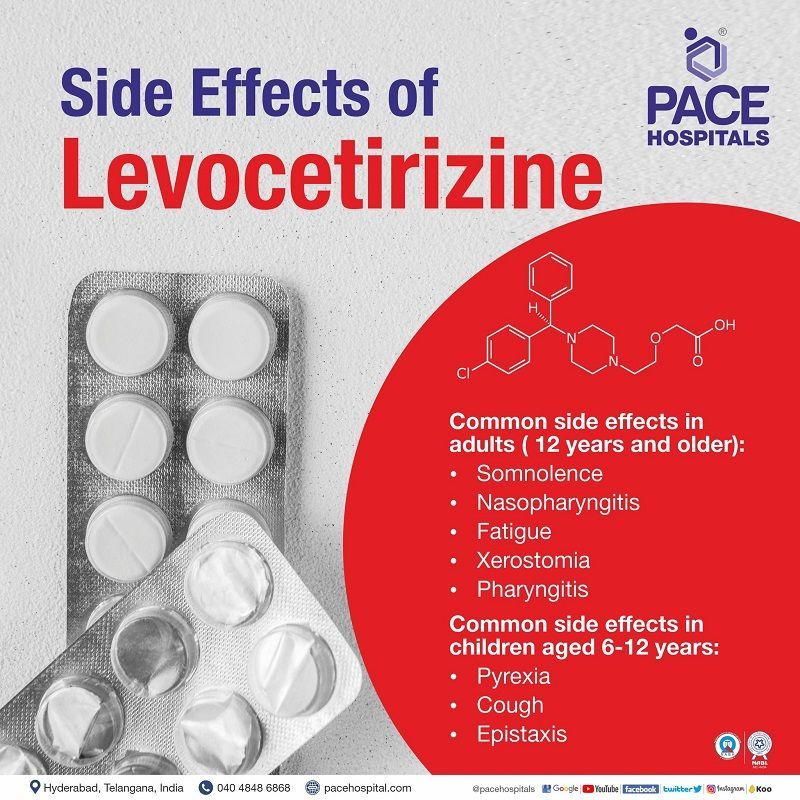
Side effects of levocetirizine on specific organs/systems
- Nervous system: Levocetirizine may induce somnolence (feeling of drowsiness), dizziness, headache.
- Ocular (eyes): Levocetirizine may cause blurred vision, and accommodation disorder.
- Gastrointestinal: Levocetirizine may cause dry mouth, diarrhoea, vomiting, constipation, and abdominal pain.
- Genito-urinary: Levocetirizine may cause dysuria (painful urination)
- Cardiovascular: Levocetirizine may cause hypotension and tachycardia (increased heartbeat)
- Musculoskeletal: Levocetirizine may cause muscle pain.
Levocetirizine contraindications
Levocetirizine is contraindicated in patients who are:
- Hypersensitive
- With end stage renal impairment
- Below 6 years of age
- Undergoing haemodialysis
- It is also contraindicated in paediatric patients of age 6–11 years with severe renal impairment
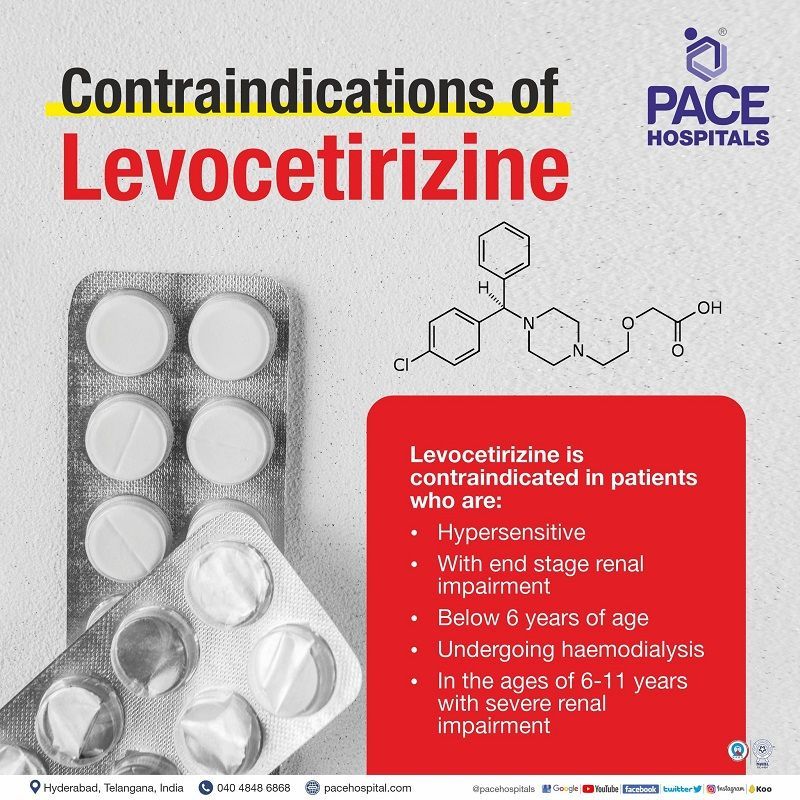
Effect of levocetirizine in pregnancy, breastfeeding, and fertility
Levocetirizine in pregnancy:
There are no studies done in pregnant women. So, we cannot correlate with humans, and hence it can be administered to pregnant women in must and need circumstances only.
Levocetirizine during breastfeeding:
There are no studies regarding levocetirizine in lactatating animals and humans, but studies in beagle dogs have shown that there is a presence of levocetirizine in breastmilk, and hence it reported that there is a possibility of levocetirizine in human milk when lactated, so levocetirizine is not recommended generally in lactating women.
Levocetirizine effect on fertility: There are no proven studies regarding levocetirizine causing infertility.
Levocetirizine interactions with other drugs
A drug interaction is a reaction between two or more drugs or food, or supplements which leads to the undesired reaction.
A wide range of effects could be expected when levocetirizine is given in combination with the various drugs. Levocetirizine interactions are:
- Isocarboxazid (anti-depressant drug): on co-administration, it leads to serious CNS (central nervous system) depressant effects.
- Alcohol: alcohol increases the drowsiness caused by antihistamines.
- Olopatadine intranasal (anti histamines): on co administration, they increase sedation.
(Most of the antihistamines shows mild and moderate interactions when given with anti-depressants and cold medications, which in turn causes drowsiness and CNS effects.)
Note: On discussion with your physician, he/she may advise you to avoid or take an alternative drug or maintain time gap if any of the above prescribed drugs are to be taken together.
Levocetirizine price in India
The price of levocetirizine tablets in India varies depending on the brand, strength, and number of tablets in a pack. However, the average price of levocetirizine 5 mg tablets is around ₹30-₹90 for a pack of 10 tablets. Here are some of the brands of levocetirizine tablets in India and their prices:
| Product | Manufacturer/Marketer | Maximum Retail Price (MRP) |
|---|---|---|
| Levocet 5mg | Hetero healthcare ltd | ₹ 43.80 for each strip (each strip contains 10 tablets) |
| Xyzal 5mg | Dr Reddy's Laboratories Ltd | ₹ 180.5 for each strip (each strip contains 10 tablets) |
| Levorid 5mg | Cipla ltd | ₹ 75.80 for each strip (each strip contains 10 tablets) |
| Levosiz 5mg | Systopic Laboratories Pvt Ltd | ₹ 46.5 for each strip (each strip contains 10 tablets) |
| Vozet 5mg | Glaxosmithkline Pharmaceuticals Ltd | ₹ 84.80 for each strip (each strip contains 10 tablets) |
| Airitis 5mg | Abbott healthcare pvt ltd | ₹ 49.45 for each strip (each strip contains 10 tablets) |
| Glencet 5mg | Glenmark pharmaceuticals | ₹ 34 for each strip (each strip contains 10 tablets) |
| Teczine 5mg | Sun Pharmaceutical Industries Ltd | ₹ 92 for each strip (each strip contains 10 tablets) |
| Zipcet 5mg | Zydus Cadila | ₹ 32.17 for each strip (each strip contains 10 tablets) |
| Levoset 5mg | Mclain Laboratories | ₹ 35 for each strip (each strip contains 10 tablets) |
| LCZ 5mg | Rapross Pharmaceuticals Pvt Ltd | ₹ 31.5 for each strip (each strip contains 10 tablets) |
| Lecope 5mg | Mankind Pharma Ltd | ₹ 29.85 for each strip (each strip contains 10 tablets) |
Frequently Asked Questions (FAQs) on Levocetirizine
Share on
Request an appointment
Fill in the appointment form or call us instantly to book a confirmed appointment with our super specialist at 04048486868

